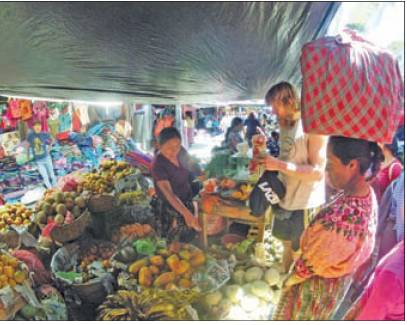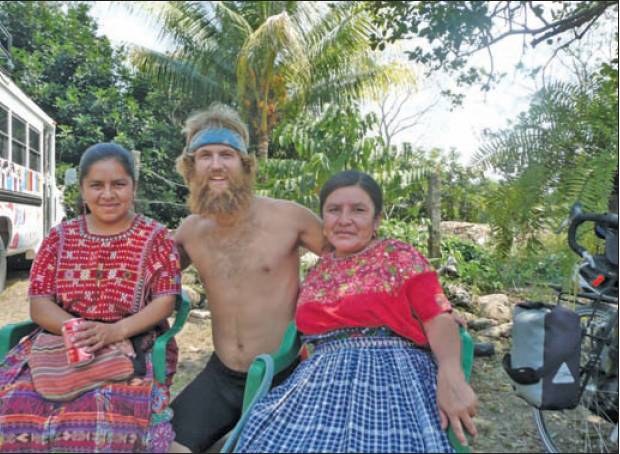The curse of the gringo
By KANAAN BAUSLER FOR THE JUNEAU EMPIRE
One of the most valuable experiences of traveling Central America is the opportunity to be a victim of discrimination. With my sun-bleached hair, bright blue eyes and skin that won’t tan beyond a dark shade of beige, I don’t stand a chance at trying to blend in with the locals. When we ride our bicycles into a new town, it’s not uncommon to hear kids shouting the warning call to their families: “Gringos! Gringos!” Sometimes they skip the foreplay and just call us “Money!” as if it’s the magic word to make us throw them our wallets.
I can’t help but feel a little offended by this. I was raised being taught that you’re not supposed to label and judge an individual based on his race or appearance. That’s what the civil rights movement from our history books was all about. You know, Rosa Parks, Martin Luther King, Elizabeth Peratovich. It seems unfair to associate me with the hoards of overly wealthy tourists just because of my heritage.
I guess I can’t complain too much though. It’s a small price I pay for the horrors that my Euro-American ancestors inflicted upon the people of this continent. I’m sure we all know the brutal history, so I won’t go into it. What we don’t know is how long into the future the effects of the damage will last.
Of course my small name-calling experience with discrimination is nowhere near the trauma of colonialism, but it’s still annoying. Exclusion is uncomfortable, no matter how it occurs.
The gringo feeling might be part of what inspired Project Waves Of Optimism at Playa Gigante, in Nicaragua. Started by surfers who first visited the area to ride the incredible breaks surrounding the beach community, the non-governmental organization sought to “improve surfing’s global footprint” by getting visitors to contribute more than just money to the town. Initiating a program of “voluntourism”, WOO attracts visiting surfers to work on projects that the community elects as top priority.
In our time there we helped with the weekly reading circle for the kids, taught English lessons in the school and painted the school building with a new fresh coat. We also attended a meeting of the healthcare committee, who were making plans for the construction of a new health center with start up costs coming from WOO fundraisers. With the growing flow of incoming tourists to Gigante, the WOO vision has evolved. Rather than just supplying laborers and organizing projects, the main goal has become the empowerment of the locals in community development decisions. By creating centralized opportunities for community member communication on impactful issues, WOO hopes to ensure that the locals maintain ownership over the future of their town.
WOO has made much progress in a mutually beneficial direction, but the gringo perception and attitude in Gigante is certainly still present. It’s hard to achieve an instant friendship connection when the primary motivations are the business of feeding a family. Obviously the tourists are a major source of income and are seen as such, for better or worse. The local-tourist relationship will always depend on the openness and attitude of the individuals involved, but from my experience I found that the opportunities for positive social interactions were much easier at Gigante than at the other Nicaragua locale, where we spent a long term visit — Ometepe Island, in the middle of Lake Nicaragua.
We visited a few different hostels on the island, and each one seemed to be a tourist bubble where the guests would, for the most part, only interact with each other. Beyond service jobs the locals rarely engaged with the tourists. A lack of interactions was further limited by the language barrier, causing a sense of distrust to develop. When locals see the tourists as the “wallets” to get money from and the tourists see the locals as the “tricksters” to avoid, a blunt relationship results.
Traveling by bicycle is great because we often get to visit towns that most tourists pass by. Forced to find secure places to sleep and ample nutrition, we have to communicate and share our story almost every day, just to get by. Interacting with folks that don’t often meet travelers is usually a rewarding experience. Aside from the occasional glare, the default reception is one of hospitality and interest. Receiving a good mix of discrimination and positive connections makes me feel that we are getting a more authentic perspective of the countries we ride through.
After bicycle touring like this, I can’t imagine myself traveling as the average backpacker does; bouncing from one hostel to the next and missing all the non-destinations in between. Those travelers on the extreme end of this spectrum are likely to only see local people as bus drivers or waiters or craft salespeople. The interaction is so limited that they probably return home with the perception that segregation is just the way it is over there in that country, gringos and locals are categories of people that don’t mix well. It must be such a relief to return home after traveling like that, where one no longer has to have her guard up and doesn’t have to see segregation so plainly.
But then again, things are not quite well in this respect at home either. Discrimination is in the eye of the beholder, and the direction that it points certainly changes the perception of its presence. Xh’unei Lance Twitchell’s recent Empire article, “Time for tough conversations” reminded me that discrimination against Alaska Natives is still a very challenging issue in Juneau, a place that I considered to be more on the progressive side of things.
“It does not make sense to argue about whether these things happen, but it does make sense to talk about what to do about it,” Twitchell wrote, in response to excuses for denying the existence of discrimination in Juneau. “It is time to face these assumptions and dig deep into the things that keep us from finding out more about each other, about keeping one another alive and well.”
It’s clear that our Native populations have suffered and will continue to do so from the effects of displacement by Euro-Americans. Colonialism endures generations, and though the impacts may become increasingly more subtle, the memories persist in everything from the languages we use for basic communication to the stories that are taught in school, told to friends, or passed on through families. The effects of colonialism are perhaps one of the only consistent themes that I continue to see along the Pacific coast of North and Central America.
Now, we’re in Panama and I’m as confused as ever. The general attitude that I get from Panamanians is a mixed bag. Sometimes the locals are excited to see us and want to hear stories and give blessings. Other times, we get cold shoulders and scowls. Interestingly, I found that in Western Panama especially, the younger crowd (adolescents and teenagers) who are usually our best customers for positive feedback seemed to be the harshest toward us. The older generations will usually return the waves and salutations, but lately I’ve been getting a lot of blank stares from the kids. Perhaps they’re starting to teach the truth about history in the schools. Maybe they’re seeing the conquistadores through me.
However, I’ve also noticed that my enthusiasm is often a big factor in the responses to my outreach. If I’m tired and uninspired, I get ignored. But if I wear a smile and sing my greetings with the glory of the day, it’s more likely that I’ll be able to make some new friends.
Such is the curse of the gringo. My people’s material advantages (whether won justly or not) have given me an undesirable reputation in many parts of the world, a reputation that needs constant energy applied to be escaped. It’s certainly far from the worst punishment resulting from the situation, but it can be exhausting at times. Small doses of discrimination are healthy for me. It reminds me that the flavor of my interactions with people can almost always be improved by my own attitude. Yet above all, it reminds me that there remains much work to be done in order to regain respect, both abroad and at home.
• Kanaan Bausler is a Juneau resident and a member of A Trip
South. Follow the group’s progress from Juneau to the tip of South
America at http://atripsouth.com.

